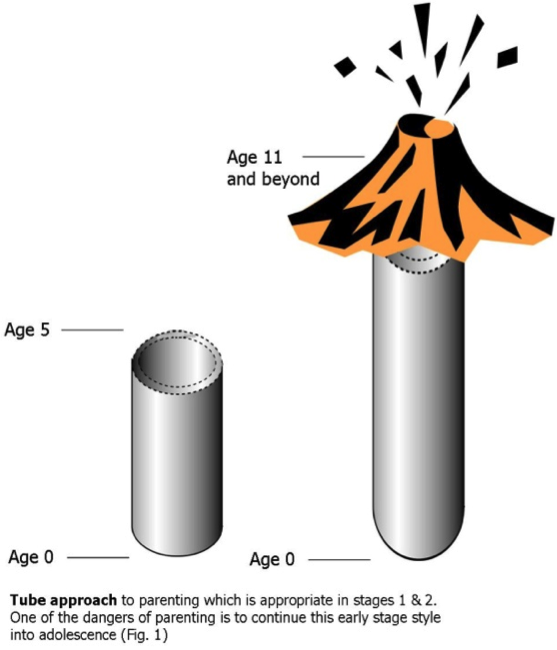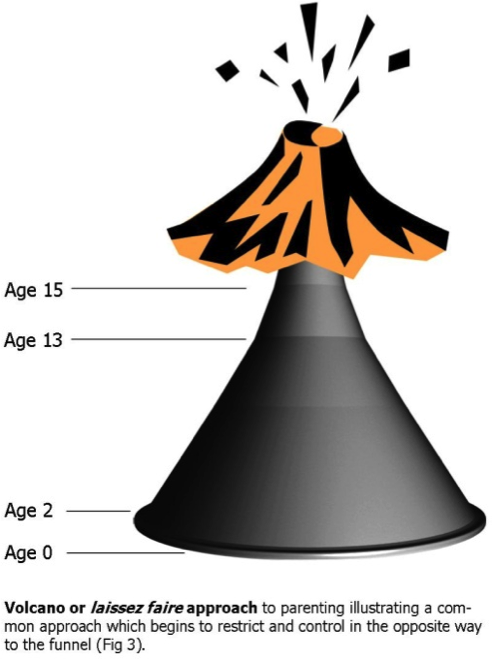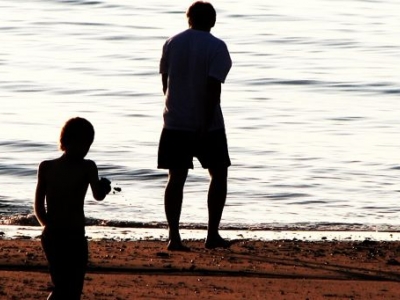
The five stages of parenting
Children have different needs as they grow. Jim French shows how our parenting should develop through these changes.
In my previous article, I spoke of the choice that Tanja and I made to navigate with our parenting style between 'the two rocky crags' of authoritarian (tube) and laissez faire (volcano) by taking a middle way which I describe as authoritative (funnel).
One of the goals that Tanja and I have for our children is to be mature in Christ. We look forward to the day when our children will stand shoulder to shoulder with us as sisters and brothers in Christ. In order to effectively pass on the faith of our Lord Jesus to them, we desire a relationship with our children based on respect that does not embitter our children leading to a breakdown in our relationship (Eph 6:1-4). It seemed to us that the tube and volcano approaches we have personally experienced and witnessed were not able to achieve this goal. Both have the potential of causing relationship breakdown in the adolescent period.
We have had a number of parents with older children warn us of the turbulent years of adolescence that lie ahead of us. We are praying that we are able to avoid this by parenting in stages that allow appropriate moral development and responsibility to be given in increasingly greater amounts, and at the same time, a genuine friendship develop between us and our children.
In order for us to think about what we do when, and at what stage in our children’s development, I’ve outlined a number of parenting stages that relate to development phases that have been identified by physiologist and developmental specialist (Piaget – cognitive; Erickson – psychological; Kohlberg & Gilligan - moral development). These stages make up the funnel’s progressions from authoritarian to authoritative and then finally to the goal of young adults who have developed cognitively, psychologically, and spiritually into maturity in Christ.1
Stage 1: Catering (Ages 0-2)
 In the first two years a child is completely dependent on their parent/s. At this stage of a child’s development, parents cater to their child, attending to their every need.
In the first two years a child is completely dependent on their parent/s. At this stage of a child’s development, parents cater to their child, attending to their every need.
Stage 2: Conforming (Ages 2-5)
We are currently in this stage of our children’s development. We are working hard to help our children learn obedience to us as their parents, but looking forward to a great goal of them being conformed in their hearts to obey God as their heavenly father and Jesus as their Lord. In this stage, we are able to begin giving biblical moral principles and developing biblical moral reason to an increasing extent with our daughter (who is approaching five).
One of the dangers that we are mindful of in parenting in these early stages, is to remember not to continue stages 1 & 2 past about the age of five. The danger is that if this restrictive authoritarian approach continues, it may well exasperate the child and result in eruptive rebellion (Fig 1), which is what Tanja and I are hoping to avoid.
Stage 3: Coaching (Ages 6 – 10)
 Preparation for this stage is dependent on sowing seeds of wisdom through the previous stage, explaining the biblical moral principle and reason when giving instructions and discipline. This begins to bear the fruit of obedience, first to us their parents, but ultimately to God (John 15:10). In this stage, Tanja and I are hoping we will be able to set up a structure for learning godly wisdom.
Preparation for this stage is dependent on sowing seeds of wisdom through the previous stage, explaining the biblical moral principle and reason when giving instructions and discipline. This begins to bear the fruit of obedience, first to us their parents, but ultimately to God (John 15:10). In this stage, Tanja and I are hoping we will be able to set up a structure for learning godly wisdom.
Our eldest child will enter primary school next year, and as she takes her first steps out into the world, we are preparing her for making wise choices. We are doing this by planning (thinking through these stages), and then training our children to take on more responsibility. Throughout, Tanja and I will continue to be intentional in giving directions, boundaries and biblical moral reasons and principles to our children.
In my previous article, I spoke about this as authoritative parenting and illustrated it as a funnel (see fig 2).2 As our children grow in wisdom and biblical moral reasoning, our early authoritarian approach will lessen. We will start to give wider responsibilities that employ a more authoritative parenting style. Running with a sporting analogy, Tanja and I will be 'on field coaches' with our children, running alongside them, coaching and directing in a process that is the beginnings of critical reflection. The process might look like this: our child does something, an action; Tanja and I explain the principle; our children continue to go forward from their experience with input from us. We hope this will lead to a growing understanding of the world and how to live as disciples of Jesus now with biblical moral reason and principle.
An example we have been using is encouraging them to be thinking about other children at pre-school who may be left out. We give them the biblical moral reason, which is that each person is precious to God. Now with our eldest child approaching five, after I encourage her with this, I now ask why she thinks it is important to be kind. This more didactic teaching allows her to think and reflect on the why she is being encouraged to be kind, rather than being told. We are praying that during this stage, we will be able to ‘loosen the boundaries’ with our children as they are show they are responsible and therefore can be given more responsibility.
Stage 4: Consulting (Ages 11-17)
As Tanja and I plan and think ahead to this stage of parenting, we have had a number of parents with older children warn us of the turbulent years during this adolescent period. We are praying that we are able to avoid this, and wonder if the more we focus on this being a stage of conflict, the more it can become almost a self-fulfilling prophecy.
We are hoping as we see our growing children go through adolescence, that we will have built a framework for biblical moral reasoning and critical reflection that they will continue on their own. Tanja and by then will have left the 'field of play' as 'on the field coaches'. Our children will be in High School, and we are aiming to prepare and equip them for this stage to be on the field on their own.
We also hope that the relationship with our children through this stage becomes a more consultative one, where our children act, experience consequences of their action, then come home and explore with us what has happened. At this stage, we can help them reflect on what happened, why it happened, and what God may be doing in this situation. We aim to do this in an open and honest way – as 'off the field' consultant coaches. A continued loosening of control at this stage will be important in preparation for our children to stand on their own with us as brothers and sisters in Christ. We are hoping to construct with them a framework for thinking and acting wisely through explaining, promoting and supporting biblical moral reasoning, principles and critical reflection. And at the same time, give progressively wider responsibility to our children.
I have observed that many parents at this stage are now attempting to 'rein in' the boundaries. In a laissez faire or permissive approach to parenting, children who have not experienced the tight control and boundaries earlier on in stages 1 and 2, are unprepared to assess and respond to what lies out there. Their parents also are not prepared and fear the worst, drawing control tightly in, in what might be described as a volcano approach to parenting (see fig. 3). This frustrates adolescents who need to begin the process of individuation - exploring who they are and where they fit into the world. This frustration is exasperated as tighter control is applied by the concerned parents. The result is eruption and breakdown of relationship. Tanja and I really want to avoid this breakdown in relationship with our children, in order to continue to disciple our children through this stage and beyond into their young adulthood. We will be attempting to avoid this volcanic eruption in these ages, by allowing our children more and more responsibility and freedom to choose wisely.
The stage has now been set through this process for young people to have learned obedience to God out of love (in stages 1 & 2). They have been given a framework of wisdom through critical reflection (Stages 3 & 4), and along the way have implicitly and explicitly been given values by their parents. Tanja and I read the bible with our children, pray, involve them in our lives showing them our ministry priorities. The values that we hope our children will adopt are seen by the priorities that Tanja and I have and our choices, particularly in our relationship with Jesus. This will be important in the role that parents have in discipling young adults, the final stage.
Stage 5: Caring (Age 18 and beyond)
At this stage, we see the goal of preparing our children for adult maturity will have been reached. Our goal for our children is maturity in Christ - which issues in wisdom and worship. However, even as adults we remain relationally the children of our parents.
The type of care that Tanja and I envision having with our children at this young adult stage of their life is not the dependent care that is seen in Stage 1, but the care of the leader. Paul uses the word “care” to describe an aspect of leadership which is an essential aspect of Christian leadership (Rom 12:8; 1 Tim 3:5). This type of care that parents have for the young adult or adult children may be seen as we pray, show gospel values expressed in our priorities, listen empathically, guide through critical reflection, and model the Christian life.
Tanja and I are at Stage Two of the parenting stages, and we have a long way to go. But our hope is that through prayer, discipling, training in biblical moral reasoning, wisdom and the word of God, we will have a good and developing relationship with our children that will see them develop cognitively, psychologically, and spiritually into maturity in Christ. We are looking forward to them standing with us as brothers and sisters when Jesus returns, and hearing Jesus say to as all, well done good and faithful servant
[1] This is similar to the stages of programming for church discipleship found in Wayne Rice (2010) Reinventing youth ministry (again); From bells and whistles to flesh and blood. Downers Grove, Illinois: IVP.
[2] Funnel Diagram was taken from Gary Ezzo & Robert Bucknam, Babywise
For more articles from Growing Faith, subscribe to our monthly e-newsletter.
To hear about the latest books and resources from Youthworks Media, subscribe here.








